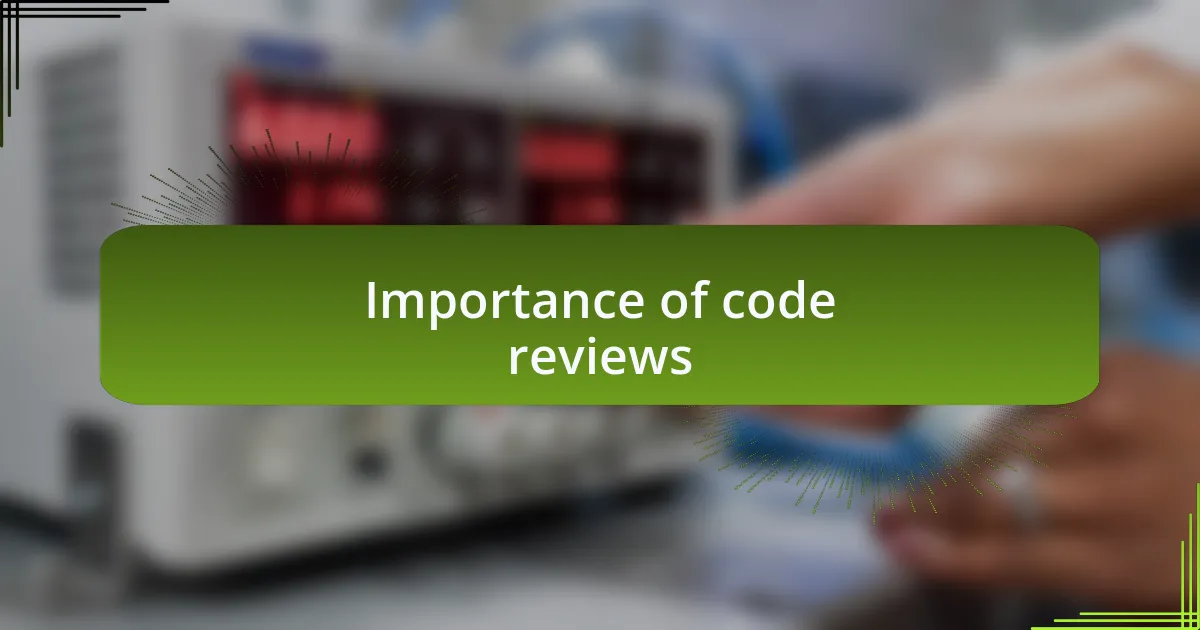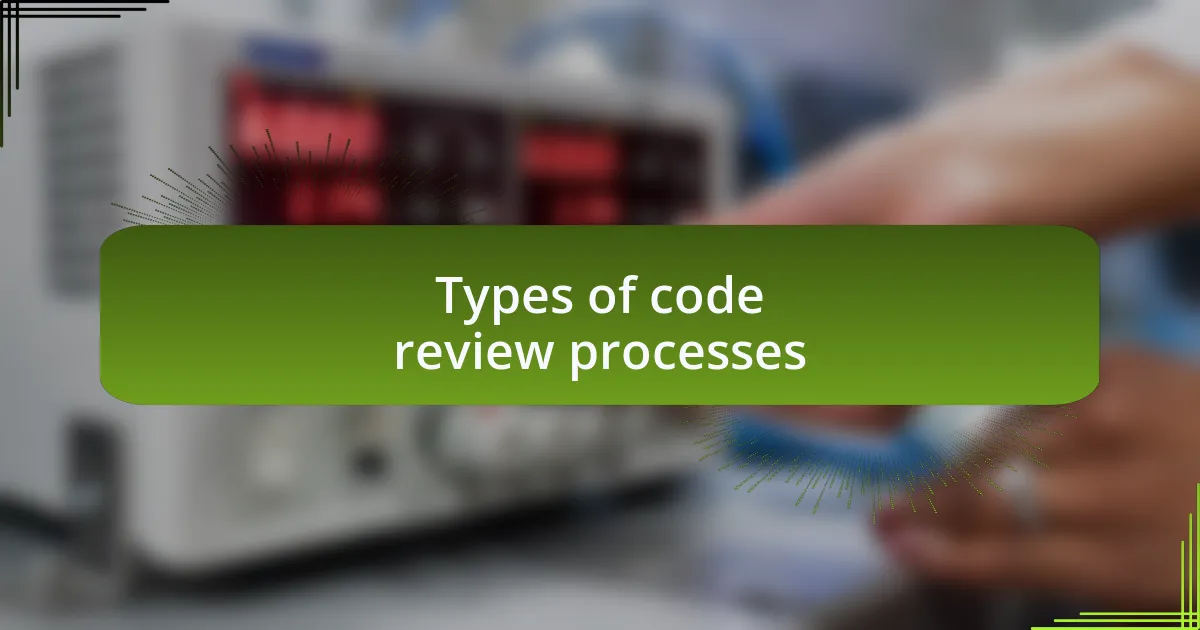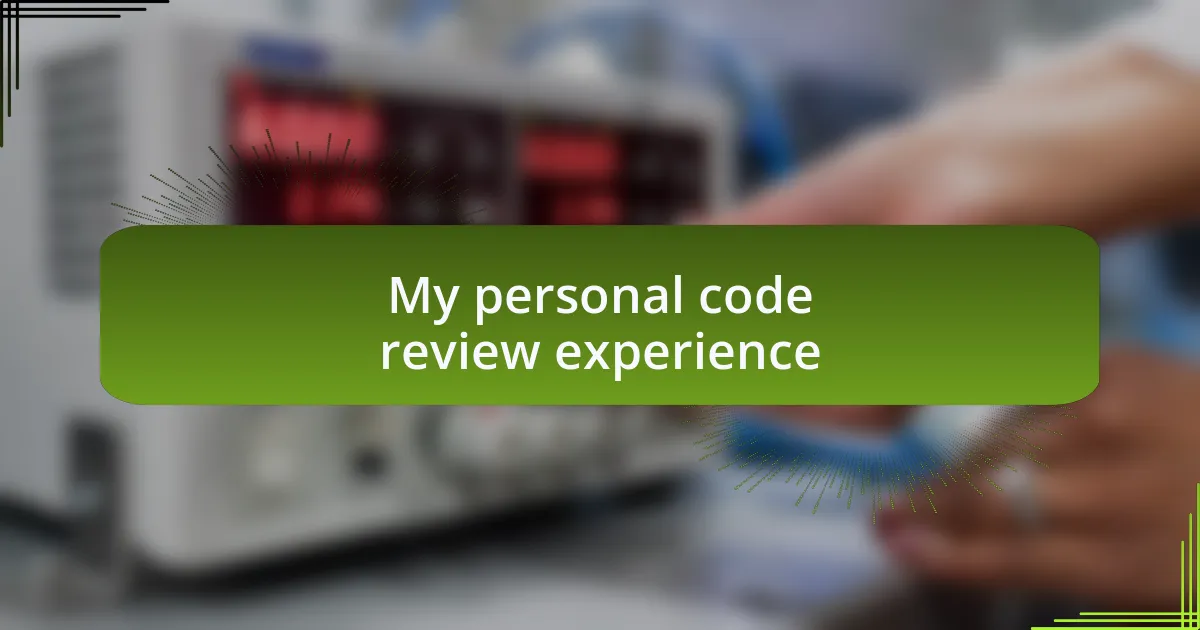Key takeaways:
- Code reviews enhance code quality, promote team collaboration, and foster a culture of continuous learning and growth among developers.
- Engaging in code reviews encourages knowledge sharing and builds accountability and trust within the team, creating a safe environment for skill enhancement.
- Different code review processes, like formal reviews, pair programming, and peer reviews, cater to diverse team dynamics and can lead to innovative solutions.
- Effective tools and clear communication strategies, such as using templates and recognizing team efforts, significantly improve the code review experience.

Introduction to code reviews
Code reviews are an essential part of the software development process, acting as a safety net for both code quality and team collaboration. I often find that these reviews not only catch potential bugs but also foster a culture of learning among team members. Have you ever felt that rush when a colleague points out a way to make your code cleaner? It’s an incredibly satisfying moment that turns feedback into growth.
When I first experienced code reviews, I was nervous—wondering what my peers would think of my work. Over time, I learned that these sessions could transform my coding approach and sharpen my skills. What I initially feared became an opportunity for inspiration and shared creativity, illustrating how collaboration enriches our projects and drives us towards excellence.
In my view, the best code reviews feel less like an evaluation and more like a dialogue where everyone contributes their insights. They encourage open-ended discussions about best practices and innovative solutions, ultimately creating a stronger, more cohesive team. Isn’t it fascinating how a simple review can lead to a whole new perspective on coding?

Importance of code reviews
Code reviews are vital for maintaining high standards in software projects. I remember a particular instance where a colleague caught a subtle error in my algorithm during a review, which, if left unchecked, could have caused major issues down the line. That experience reinforced my belief that these reviews protect not only the quality of our code but also our project’s overall integrity.
Engaging in code reviews also encourages knowledge sharing among team members. I’ve found that when discussing my approach to a challenging problem, my teammates often bring fresh ideas that I hadn’t considered. This exchange transforms the review into a collaborative brainstorming session—doesn’t that make you appreciate the diversity of thought in tech teams?
Moreover, I’ve noticed that regular code reviews build a culture of accountability and trust within the group. The more we respect each other’s work, the more confident we feel about voicing our opinions and suggestions. It creates a safe space where everyone can enhance their skills together, fostering an environment focused on collective improvement. How often do you witness this kind of growth in your own team dynamics?

Types of code review processes
When it comes to code review processes, there are several popular methodologies that teams can adopt. One approach is the formal code review, where a dedicated reviewer checks the code after it’s completed. I remember my first experience with this method; the structured nature provided me with a framework to incorporate feedback systematically. It felt like a mini audit of my work, and while it was a bit nerve-wracking, I appreciated the thoroughness that came with it.
Another common method is the pair programming review, where two developers work together on the same piece of code. I still think about one particular session where my partner and I completely transformed a section of logic thanks to our live discussion. The immediacy of feedback kept us both engaged and led to better solutions than either of us could have achieved alone. Have you ever experienced that “aha!” moment when collaborating so closely with someone?
Lastly, some teams opt for peer reviews, which are typically less formal and rely on mutual trust among developers to evaluate each other’s work. I’ve found this approach fosters a more relaxed atmosphere, making it easier to open up about mistakes. I recall a time when a casual peer review uncovered a recurring bug that I had overlooked; revisiting that code with a friend allowed us both to learn and grow. What do you think—does a friendly atmosphere make feedback easier to receive?

Tools for effective code reviews
When it comes to tools that make code reviews more effective, I often turn to platforms like GitHub and Bitbucket. These tools provide a seamless interface for reviewing code changes, allowing comments directly on the lines of code. I remember my first time using GitHub’s pull request feature; the clarity it offered in tracking discussions and decisions was a game changer for me. Have you ever navigated through a complex code base and wished for a visual guide? That’s exactly what these tools provide.
Another great tool I’ve leveraged is CodeScene, which combines code review with analytics. It reveals hotspots in the codebase—areas that may need extra attention during reviews due to their complexity or recent changes. I once worked on a project where this insight helped us identify not just bugs but also parts of the code that our team struggled with consistently. It was eye-opening to see where our focus should be, and it encouraged more informed discussions during reviews. How often do you find yourself trying to identify those critical areas?
Lastly, I can’t overlook the value of using communication tools like Slack alongside code review platforms. Creating dedicated channels for code discussions has enhanced my collaborative experience, turning reviews into a dynamic conversation, rather than isolated comments. I recall a time when a quick message in Slack clarified a miscommunication from the review, leading to a stronger final product. Have you ever realized how much easier it is to refine ideas when you’re not just hiding behind a screen? It’s these tools that bring us together, making the code review process not just effective, but also enjoyable.

My personal code review experience
Reflecting on my personal code review experiences, I recall feeling a mix of excitement and anxiety during my first few reviews. I remember submitting my code with high hopes, only to receive a flurry of comments that made my heart race. How many of you have felt that initial dread, thinking, “Did I really overlook that?” Over time, I learned to view those comments as an opportunity for growth rather than criticism, gradually shifting my perspective to embrace feedback as an essential part of becoming a better developer.
One particular instance stands out for me: working on a collaborative project where our team was tasked with refactoring an outdated module. The review process felt daunting due to the complexity involved. However, during the review, my colleagues not only pointed out potential improvements but also highlighted the innovative approaches I had taken. That moment made me realize how code reviews can build confidence and foster a sense of camaraderie among developers. Have you ever experienced a moment where feedback truly uplifted your work?
Another memory that lingers is during a review session with a more experienced developer who had a knack for asking the right questions. Instead of simply suggesting changes, they posed inquiries that made me think critically about my choices. I found myself re-evaluating my approach in ways I hadn’t considered before. This taught me that effective code reviews are about dialogue—not just checking boxes. Do you think asking the right questions can transform a review from a chore into a collaborative exploration?

Challenges faced during code reviews
During code reviews, I’ve often grappled with the challenge of differing opinions. It’s not uncommon to encounter disagreements on best practices or design choices. I remember a time when a colleague and I had opposing views on how to structure a component. The tension was palpable, creating an environment where I felt defensive rather than open. Have you ever been in a situation where feedback turned into a debate instead of a discussion? That experience made me value the importance of fostering an atmosphere of respect and curiosity during reviews.
Another hurdle I’ve faced is the sheer volume of feedback received. I once submitted a feature that I believed was polished, only to be met with what seemed like endless comments. It felt overwhelming at first, like trying to drink from a fire hose. How do we ensure that the review process is constructive and not discouraging? I’ve learned that prioritizing feedback and addressing critical issues first can help maintain momentum and motivation.
Time constraints can also create pressure during code reviews. I recall a deadline looming over a project, and I watched my team scramble through reviews just to keep up. The rush often sacrificed thoroughness, leading to missed opportunities for valuable improvements. Has anyone else felt the strain of balancing speed with quality? This taught me that setting realistic timelines for reviews can foster a more thoughtful and productive process, ensuring quality isn’t compromised in the name of expedience.

Tips for successful code reviews
When it comes to successful code reviews, clear communication is essential. I’ve found that starting with a brief overview of the changes can set the right tone. Once, I chose to walk my team through a complex logic change I made, which not only streamlined the process but also allowed others to ask questions early on. Isn’t it easier to address concerns when everyone is on the same page from the start?
One technique that has worked wonders for me is the use of templates. They can serve as a guide for reviewers, ensuring that they focus on key aspects without getting lost in the details. For example, I once implemented a checklist that highlighted areas like security, performance, and code readability. It helped my team remain consistent and significantly reduced the time spent on revisions. Ever wondered how much smoother reviews could be with just a bit of structure?
Finally, I believe in celebrating the wins, no matter how small. After an intense review cycle, I once organized a casual team meeting to recognize the hard work everyone put in. Acknowledging effort not only boosts morale but also encourages a positive review culture. Have you seen the difference a little appreciation can make? I certainly have—it inspires everyone to keep striving for excellence.